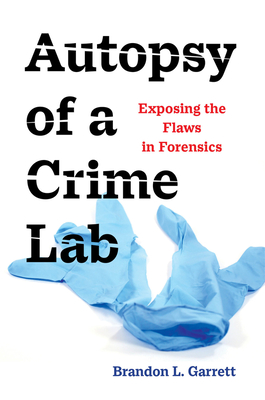

 University of California Press
University of California Press
Autopsy of a Crime Lab: Exposing the Flaws in Forensics


Key Metrics
- Brandon L Garrett
- University of California Press
- Hardcover
- 9780520379336
- 9.1 X 6.2 X 1 inches
- 1.15 pounds
- Law > Forensic Science
- English
 Secure Transaction
Secure TransactionBook Description
This book exposes the dangerously imperfect forensic evidence that we rely on for criminal convictions.
That's not my fingerprint, your honor, said the defendant, after FBI experts reported a 100-percent identification. They were wrong. It is shocking how often they are. Autopsy of a Crime Lab is the first book to catalog the sources of error and the faulty science behind a range of well-known forensic evidence, from fingerprints and firearms to forensic algorithms. In this devastating forensic takedown, noted legal expert Brandon L. Garrett poses the questions that should be asked in courtrooms every day: Where are the studies that validate the basic premises of widely accepted techniques such as fingerprinting? How can experts testify with 100 percent certainty about a fingerprint, when there is no such thing as a 100 percent match? Where is the quality control in the laboratories and at the crime scenes? Should we so readily adopt powerful new technologies like facial recognition software and rapid DNA machines? And why have judges been so reluctant to consider the weaknesses of so many long-accepted methods?
Taking us into the lives of the wrongfully convicted or nearly convicted, into crime labs rocked by scandal, and onto the front lines of promising reform efforts driven by professionals and researchers alike, Autopsy of a Crime Lab illustrates the persistence and perniciousness of shaky science and its well-meaning practitioners.
Author Bio
Brandon L. Garrett teaches law at the University of Virginia School of Law, where he has been a professor since 2005. His research on our criminal justice system has ranged from the lessons to be learned from cases where innocent people were exonerated by DNA tests, to research on false confessions, forensics, and eyewitness memory, to the difficult compromises that prosecutors reach when targeting the largest corporations in the world.
In 2011, Harvard University Press published Garrett's book, "Convicting the Innocent: Where Criminal Prosecutions Go Wrong," examining the cases of the first 250 people to be exonerated by DNA testing. That book was the subject of a symposium issue in New England Law Review, and received an A.B.A. Silver Gavel Award, Honorable Mention, and a Constitutional Commentary Award. It is has been translated in Japanand Taiwan, and is China. In 2013, Foundation Press published a casebook, “Federal Habeas Corpus: Executive Detention and Post-Conviction Litigation,” that co-authored with Lee Kovarsky. Garrett's new book examining corporate prosecutions, titled “Too Big to Jail: How Prosecutors Compromise with Corporations,” was published by Harvard University Press in Fall 2014. It is currently being translated in Taiwan and Spain. Garrett's law review articles can be downloaded on SSRN.
Garrett's work has been cited by courts, including the U.S. Supreme Court, lower federal courts, state supreme courts, and courts in other countries, such as the Supreme Courts of Canada and Israel. Garrett also frequently speak about criminal justice matters before legislative and policymaking bodies, groups of practicing lawyers, law enforcement, and to local and national media. He attended Columbia Law School, where he was an articles editor of the Columbia Law Review and a Kent Scholar. After graduating, he clerked for the Hon. Pierre N. Leval of the U.S. Court of Appeals for the Second Circuit. He then worked as an associate at Neufeld, Scheck & Brustin LLP in New York City.
Garrett lives in Charlottesville, Virginia with his wonderful family. In all of his spare time, he tries to paint.
Community reviews
Write a ReviewNo Community reviews



